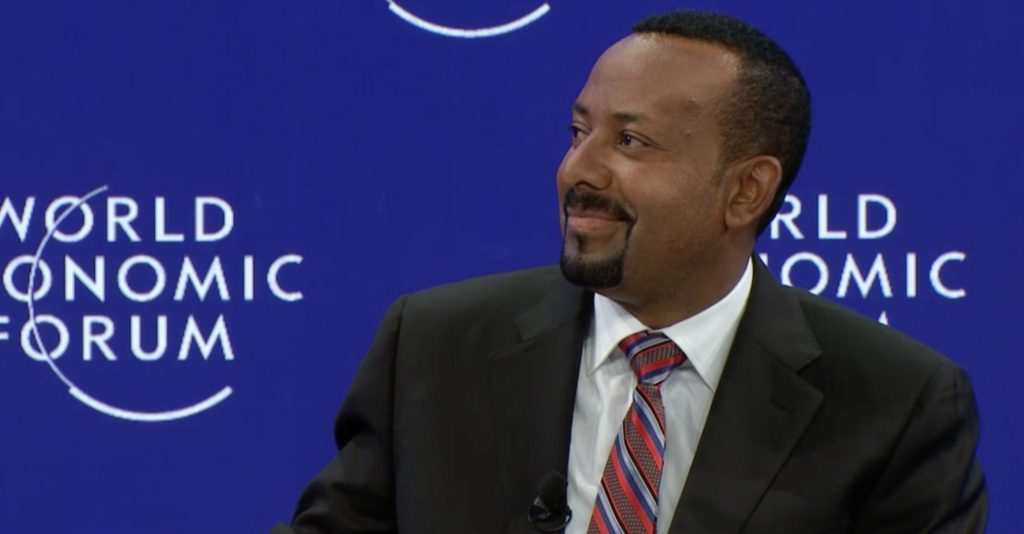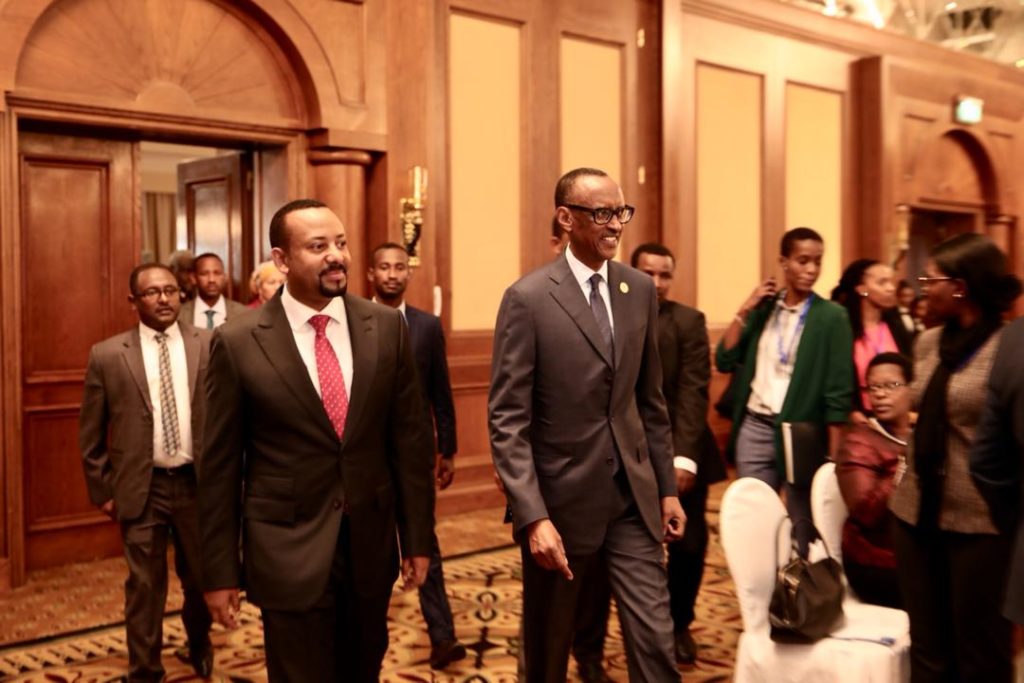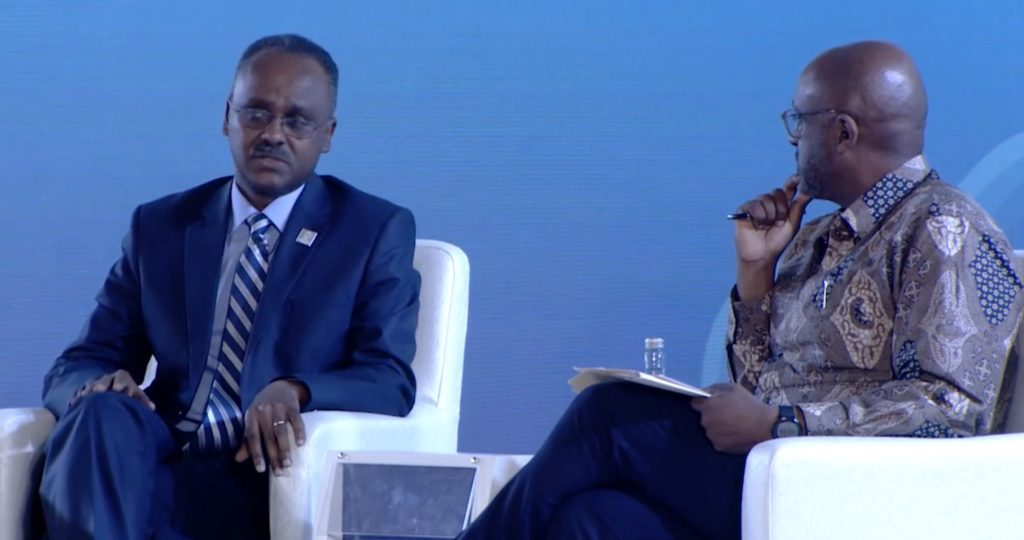Democracy, economic vitality, an inclusive society are keys to Ethiopia’s vibrant future, says Premier Ahmed

COVER STORY
Kemi Osukoya
April 2019
ON A VERY COLD LATE JANUARY DAY at a luxurious business resort nestled in the alps of Davos in Switzerland, Dr. Abiy Ahmed, the new Prime Minister of Ethiopia who was elected to office a year ago, is getting ready to step to a podium to deliver a speech to a room filled with international audience, a community of very powerful men and women, leaders and influencers from the public and private sectors who have gathered at the resort for the annual World Economic Forum.
Speaking eloquently after he steps to the podium, the 42 year-old charismatic Premier, who is quickly becoming accustomed to being in the political limelight and the focus of the media, shares his vision and the new agenda for Ethiopia, including the reforms and changes that are taking place in his beloved country, Ethiopia. “I’m happy to share a renewed vision and commitment to positive reforms,” Prime Minister Ahmed, standing confidently behind the podium wearing a black suit, white shirt and stripped tie, apprises the heedful business audience who has come to see him. “Ethiopia is indeed undergoing an area of political and economic reform. The reform is people centered and has three interdependent pillars. The first is a vibrant democracy, second is economic vitality and the third is regional integration and openness to the world.”
“Our reforms is deeply rooted in the philosophy of [organic] change and building on the gains of the past while reminding [ourselves] of our rich heritage. It also reflects on modern realities, exchanging the synergies in politics, economics, technology and society. We aim to establish a virtual cycle between these elements and among our partners to enable us to meet our challenges in a profitable manner,” the Prime minister explains, leaving no doubt in the audience’s minds about what he means and aims to achieve during his incumbency.
In other words, what he means is that the Ethiopian government sees the interlinkage between democracy and development and thus has chosen to set up its agenda and decisions on the conviction that the reforms put in place will ameliorate living standards for citizens as well as elevate the country’s competitiveness in the global markets and economy at large. Based on this conviction, the government has become extremely efficient at converting people and businesses to embrace the new strategy to help it meets its target goals of attaining a sustainable competitive economy.
Not that many of those in the audience that day ever doubted Premier Ahmed’s competency of achieving those goals. In fact, many were already cognizant of his efficacy, and the transformative transitions that are taking shapes in Ethiopia under his leadership as well as the impressive impacts his anomaly creme de la creme African leadership has already made, not just in his country, in the African continent and the international community as well. His speech is just meant to reassure these elite business audience that the country that many in the international sphere have come to consider a paragon of democratic and economic virtues in Africa in the past decades is once again headed in the right direction.
His age alone speaks volumes since Africa is a young population, most see him as one of them,”
Addis Alemayehou
More have happened in the last few months in Ethiopia under Premier Ahmed’s leadership than in the last decades. Since he took office a year ago, he has revamped the government and nation, taking bold initiatives, including important economic reforms, as well as political reforms—dispensing with the nation’s anachronistic governance style, much to the delights and enthusiasm of its major young population. On the international front: he negotiated a peace agreement with Eritrea to end two decades of hostility between the two neighboring east African countries, as well as initiated a peace dialogue between Djibouti and Eritrea. He also persuaded South Sudan leaders to restart negotiation about peace agreement again.

His leadership style, expediency of executing much needed actions are anomalies in Africa, a continent often associated with ineffective leadership. Perhaps what is most inspiring about these heroic, audacious and historical achievements is not just that they are phenomenon achievements for Ethiopia on their own given the significance and their expediency of time- it’s a deep breath of fresh air for a continent that has long been stigmatized and caricatured on the international sphere with destitute images of impoverish nations and people and plagues.
“His age alone speaks volumes since Africa is a young population, most see him as one of them,” says Addis Alemayehou on why Premier Ahmed’s leadership resonates with so many people on the continent and beyond. Mr. Alemayehou, an Ethiopian national, is the Chief Executive Officer of Ethiopia-based advertising agency, 251 Communications. “The speed at which he’s made radical transformation in Ethiopia and within the wider Horn and East Africa region has given him a huge following not only in Africa but beyond.”
Mr. Alemayehou believes young Africans who aspire to hold political or leadership positions on the continent can learn a thing or two from the new Prime Minister’s remarkable political journey. He urges young people to aim high, work hard, keep their eyes on the target. “Always learn [new things], think beyond yourself and never ever give up. The Prime Minister comes from a very humble background and from a region that is away from the power center in Addis Ababa, he worked tirelessly and I believe as he has shared several times knew that he would land where he is today,” says Alemayehou.
Though relatively unknown in the international sphere at the time when he became the Prime Minister last year, Premier Ahmed was modestly known in the Ethiopian political scene as a rising star and since then, his political acumen, noble acts, charismatic amiable personality, and optimism for his country and the rest of Africa have catapulted him from obscurity to prominence on the international stage in a matter of a year. Now the nation and citizens once again are beginning to feel like eminent in the domestic and international sphere and the African diaspora is also celebrating in the success.
“We have a young Prime Minister that is highly motivative and energetic, who aims to take the gains the country has made to the next level. He has already started to take bold policy measures and this has created a lot of enthusiasm, not only in Ethiopia but across the world,” Ethiopia’s Former Minister of Finance, Abraham Tekeste delightfully told the audience present at the Governor Talk with Abebe A. Selassie, director of the African department at the International Monetary Fund, during the World Bank Group/International Monetary Fund annual meeting in Indonesia last October. “We aim to tap into the new enthusiasm created as a result of the leadership of the Prime Minister to drive growth, to diversify the economy and creates jobs for young people and promote export. I don’t know how people will factor this into traditional economic model, I think the inspiration and excitement created in the country could be a force for change for good.”

It’s the first time in the country’s recent history or at least in a long time, that many of its citizens feel relatable to their government and see their leader articulates a big vision that is inclusive well as progressive. Citizens are now very enthusiastic and want to be in charge of taking the country to the next level. The private sector is also very enthusiastic about the policy measures that the Prime Minister is taking, all the more reasons why there’s been a boost of optimism and enthusiasm in Ethiopia and across Africa since he took the helm as Ethiopian government leader.
“The Prime Minister has transformed the country in a number of ways both on the political front as well as on the economic side. He’s released every journalist and opposition members from prison, lifted the state of emergency, banned blocking of social media, invited back opposition figures and rebel movements into the country. On the economic end, he’s working on a policy that will drastically open up the Ethiopian economy to outside investment and has put the private sector as the engine of his government’s economic plans which was a drastic shift from the previous regime,” notes Alemayehou, commending the jobs the Prime minister has done so far.
“We have a young Prime Minister that is highly motivative and energetic, who aims to take the gains the country has made to the next level.
Ethiopian Minister of Finance
Prime Minister Ahmed comes to the political stage in Africa at a time when the continent is concurrently undergoing major economic, technological and political transformations, and political leaders are being held accountable by citizens to produce socioeconomic results and are expected to not only deliver quantifiable progress of economic growth but to parlay that growth into tangible developments that improve the lives and livelihood of the population as well as help move their countries into the global economy. A high call for some, but not for Premier.
Ethiopia is among the fastest growing economies in the world today, averaging over 9 percent growth in the last decade. Its GDP has multiplied tenfold in the last 25 years, poverty has been halved and educational enrollments have increased. Significant investments in infrastructure also have contributed to the economic growth and attracted foreign investment into the country, making the country one of the leading countries in Foreign Direct Investment. It has also been a model of democracy in Africa and a major ally of the U.S. government as well as other European nations.
While these achievements show tremendous economic success and represent the government’s commitment to development of progress in the country, the relatively new Prime Minister is also setting a new benchmark than his predecessors, one that includes an open and inclusive government, allowing women to hold top leadership positions in the government, creating livelihood opportunities for the young population and repealing outdated laws that banned freedom of expression in the country. His plan is to execute some of these economic and political reforms by using the private sector as an economic vehicle, particularly the small medium-sized enterprises, and the public as a collective unit to drive more inclusive, socially sustainable economic and development growth in the country while also prioritizing providing access to capital for SMEs and see SMEs as a vehicle of economic growth.
“We are determined to bring Ethiopia to the center of the global economy and to do so, we will leverage the collective power of the people, especially women and the youth and use the private sector to drive more inclusive, socially sustainable growth,” says Prime Minister Ahmed in his remarks at the WEForum in Davos. “We believe it’s not possible to sustain growth, attract investments and allow all Ethiopians to benefit from the growth and dividends without embracing democracy and persuading the world to invest in our economy.”
His government’s core objective is to build a sustainable fast paced economic growth and to create more and better jobs in the country. The government is also embarking on a privatization transition program, which will allow it to privatize a selected set of its public sector business such as telecommunication, transports, logistics, and energy— partially and some fully.
This new agenda-reforms that he touts—which include promoting structural transformation of the economy by tapping into the private sector capacity as well as improving the competitiveness of the overall economy through diversification— is supposed to help the country and its citizens, particularly the youth population who are under the age of 30, which is over 75 percent of the country’s estimated over 100 million population. For this reason alone, it becomes obvious why it’s really critical for the government to focus on creating an environment that is conductive for the private sector to flourish and create jobs for the youth. “It is a matter of national security for the country,” notes Alemayehou.
Mr. Alemayehou adds that the biggest concern nationally in Ethiopia is the peace and the economy which go hand in hand. “I believe the economic reforms are genuine and will transform our economy as never before, it will be up to the local business community to take the opportunity and help the government in supporting it’s efforts to create jobs and businesses that are sustainable and that will keep Ethiopia growing for the following few decades,”says Alemayehou.
As a result of these reforms, which also include creating an inclusive environment for Ethiopian women to occupying key positions in the government, including the Minister of Defense, Minister of Transport, and the newly established Minister of Peace. The country also appointed its first Chairwoman of the Federal Supreme Court and the parliament just elected the first woman head of state in modern history of the country. All of these efforts are working in tandem and are a part of the Prime Minister’s top priorities in moving the needle forward in the country’s political as well as economic trajectory.
The government is also betting on its young population to help spur the economic growth the country needs to become a competitive market by creating an enabling environment for youth to thrive. “We cannot hope to progress as a nation and an economy if we disqualify half of our population from full and equal participation. We must create the condition that enable demographic dividends and to harness the potential of our young and energetic population. To do so, we have to invest in the aspirations of our youth by improving educational standard and create fresh opportunities through careful planning and strategic repositioning,” says Ahmed.
The government’s investments in its youth population has already began to yield socioeconomic dividends. One of the companies that is helping to spur that benefits is Gebeya Inc, a technology firm co-founded by Amadou Daffe that helps to train Ethiopian youth in technology. The firm recently received a financial booster from the International Finance Corporation, the private sector financial-arm of the World Bank Group, to expand the program within Ethiopia.
Another area of focus for the government is to build upon the progress made by some of the major economic initiatives started by his predecessors such as the Industrial Park projects—a business hubs for manufacturing businesses that removes all the red tapes and other challenges that many businesses and investors face when setting up their companies. Ten projects are scheduled to be build across the country in large scale. The government plans to expand the projects to provide better opportunities and enabling environment for the private sector to thrive in the country.
The idea behind having these industrial parks is to create a better investment business climate in a controlled environment that allows manufacturers, both local and foreign companies to thrive by circumventing some of the government services deleterious bureaucratic red tapes. Businesses that are located in the industrial parks are able get better registration licensing and other regulatory services from the government, including a reliable, quality electricity, logistics services, business counseling and skill development. All that a manufacturer has to do is to bring their machineries, plug it in and start producing stuffs to export.
Four of the industrial parks have been completed, and are currently operational and have started producing and exporting goods. Each of these industrial parks individually specializes on a specific manufacturing area. For example, one of the ones currently in service specializes on garment, textiles, footwear and leather manufacturing. Another one in the progress will specialize in agri-processing.
As part of its efforts to make sure the projects remain successful, the government is taking steps to amalgamate these businesses into the wider economy to make sure these manufacturing hubs do not become enclaves on their own. Since some of the industrial parks became operational, the country has seen a spike in its exports.
The country has also activates its economy policy plans to open its markets up to foreign investors by offering attractive incentive packages, including business tax exemption for manufacturers for up to six years and ten years for businesses in agriculture to help spurs the investments the country needs for development as well as increase the competitiveness of the financial market to serves as an alternative in mobilizing funding to increase development.
While it’s not yet known whether all of Prime Minister Ahmed’s agenda and reforms will pan out well and yield the economic growth he talks about. For now, the world at large, especially the African diaspora, is earnestly cheering and rooting for the Prime Minister and Ethiopia to succeed because Ethiopia’s success is Africa’s success. His leadership has already ushered in a new wave of transformation in Ethiopia as well as across Africa. And as Alemayelou points out, “Leadership matters at the top and showing by example is the way to go, less talk and more action is needed in Africa. We have no time to waste.”



